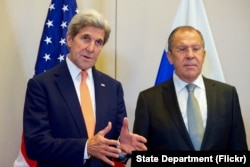A senior U.S. official says it is up to Russia to demonstrate that a cease-fire plan for Syria can still work.
The official said high-level meetings were planned with Russia "to try to get a sense from them about where they think this can go from here." Consultations were also ongoing with envoys from the 19-nation International Syria Support Group and the U.N. Security Council.
French Foreign Minister Jean-Marc Ayrault, who was due to to attend an ISSG meeting Tuesday, said the U.S.-Russian cease-fire deal “remains the only hope to resolve the conflict."
The truce was meant to pause fighting between the Syrian government and rebels, limit Syrian airstrikes that in the past have been blamed for killing civilians, and to allow for delivery of humanitarian aid. But as with earlier agreements, both sides accused the other of violations and the pact had largely fallen apart after a week.
On Monday the United Nations said a joint aid convoy with the Syrian Red Crescent was bombed west of the city of Aleppo.
International Federation of Red Cross and Red Crescent Societies spokesman Benoit Carpentier told reporters Tuesday in Geneva that one aid official and several civilians were confirmed dead in the strikes that destroyed multiple trucks and a warehouse.
Jens Laerke, a spokesman for the U.N. humanitarian aid office, said all convoys have been suspended pending a review of the security situation. But he also stressed a commitment to "stay and deliver to everyone in need in Syria."
The agency's head, Stephen O'Brien, issued a statement that said if the strikes are found to have been deliberate, they would amount to a war crime.
It remains unclear whose aircraft struck the convoy. The Pentagon said the U.S.-led coalition was not involved, and a senior U.S. official said there were only two other possibilities, referring to Syria and Russia.
"What took place today, unfortunately, is fundamentally consistent with a pattern and a practice that we have seen going back for a number of months and even years in which the Syrian regime has taken strikes against not only on people and civilians but opposition groups that are protected by the cessation of hostilities, and made life miserable and extraordinarily difficult for aid workers trying to provide assistance to the Syrian population," the official said.
Agreements involving the Syrian conflict have often been based on the idea that Russia would help push its ally Syria to comply, while the United States would do the same with the rebels it has backed. The latest agreement included a plan for the U.S. and Russia to set up a cooperative effort to target Islamic State militants, if the cease-fire endured for a week.
Russia's defense ministry said rebel violations made it "pointless" for government troops to uphold the truce.
Syrian state media quoted President Bashar al-Assad as saying airstrikes by the U.S.-led coalition that hit Syrian army positions near Deir Ezzor on Saturday were a "flagrant aggression" that showed support for terrorists. The U.S. has expressed condolences for the strike and is still working to determine exactly what happened.






